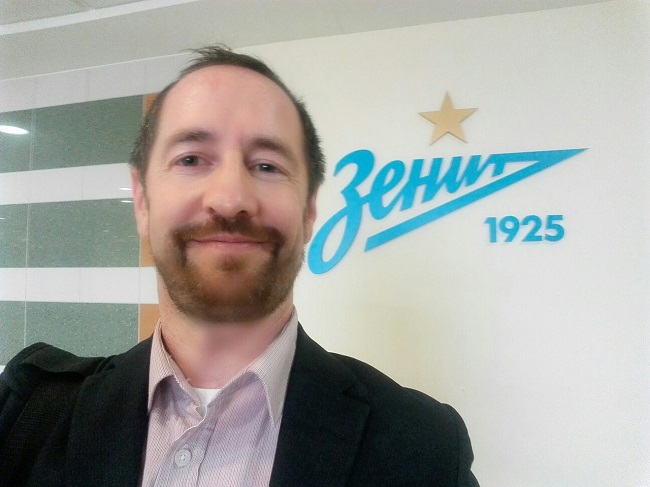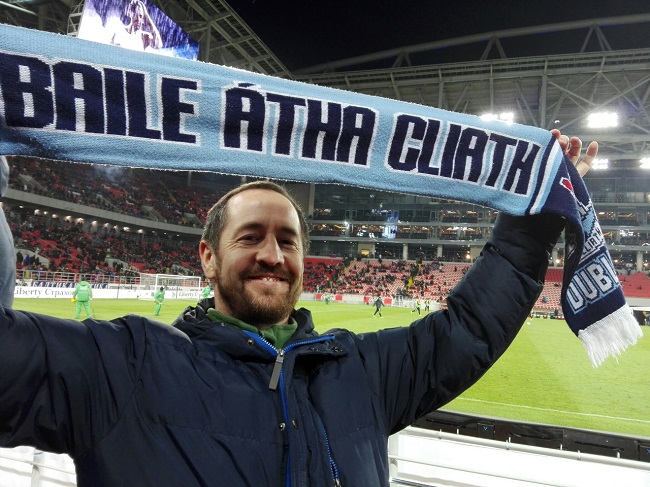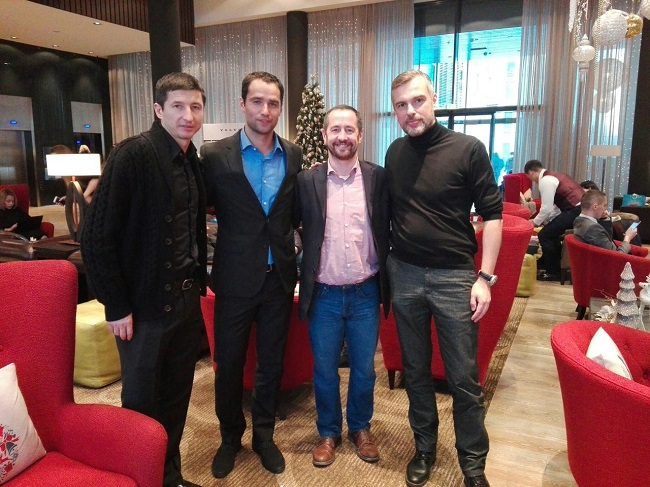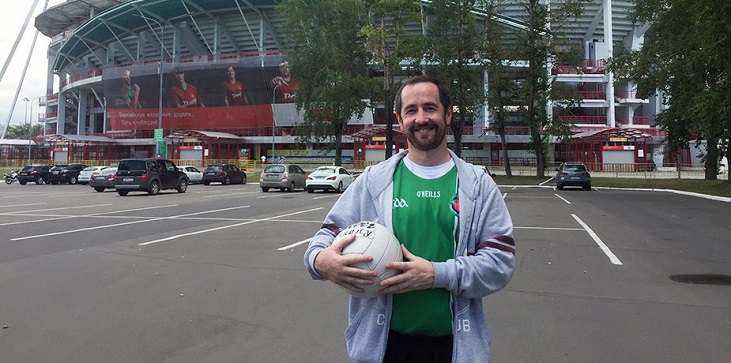About the author: Since filing his first article with the Irish Press newspaper in April 1990, Alan Moore went on to a career in professional sports, including playing soccer and boxing Internationally. From 1998 he moved fully into sports media, administration and management with elite clubs and athletes in Europe, North America, Africa, Asia and the Middle East. Some of his former clubs include: Spartak Moscow, Hajduk Split, Eintracht Frankfurt and PEI Senators. As a project manager he has worked with major event bid teams, National Delegations and advising National Sports Federations. He is a columnist with Russia Today and contributes to channels including BBC, TRT World and CC TV.
A specialist in sports governance and nutrition, is based in Moscow and continues to consult in and report on sports. He is also Head Coach of the Moscow Shamrocks Gaelic Football Club You can follow him on Twitter or his website.
When the editor asked me to do a long read about me and Russian football, I agreed and thought — easy peasy! As an archaeologist I looked at digging into my brain archive, dusting off some memories and chronologically regurgitating them. I began to write and hit a wall. So I stepped over to my marketing and PR side, thinking, yeah, I can polish off a love story, make it shine and hey presto, job is done. I ran out of spit 500 words in. I was running out of time, options and patience.
Sitting on my couch in Moscow, watching Egypt and Morocco fight for a semi-final spot in the AFCON 2017, it came to me. Nobody wants to read self-aggrandisement. Bigging up my past is not interesting. I looked at 2 articles written by the great man himself and thought — my experience of Russian football has been enhanced by many and diminished by very few. I’m not interesting, those I’ve interacted with are. So, 3rd time lucky.
Shto eto?
27 years ago this April I first received money for an article. It was the princely sum of Irish Punt £12 (c. €15) and the man who gave me the commission, Hugh Lambert, did so after I wrote him a letter asking for work experience. I’d a recommendation from one of my schoolteachers, Denis Keane (brother of John B.) and it was that that did the trick I reckon. The challenge, that I chose to accept, was to get interviews with the Italia ‘90 bound Soviet Union team. In Dublin to play the Boys in Green, it was a case of location, location, location. My school was next to Lansdowne Road and we knew how to get into the ground free of charge. What happened next gave me reason to feel affection for Russian football.
“Shto eto?” (what is this) — came the voice as somebody grabbed me by the shoulder. I’d just gotten into the Soviet dressing room before the warm up. I looked up and the man glaring down at me asked me, in Russian, what was I doing there. I held up the dictaphone I borrowed from my Dad and said, “Interview.” Valeri Lobanovski shouted to a hassled assistant and I was put sitting on a chair in the corner. Instead of being thrown out, my first professional interview was with Fyodor Cherenkov. With trembling hands I asked him how he liked Ireland (he liked Dublin, the city was small and the people friendly), their chances in the World Cup (tough opposition, USSR are good, maybe semi-final), would he like to play in England (maybe Germany or Spain) and how he rated Ireland (good, very tough, but USSR will win). At the end of our 3 translated minutes he autographed my programme and shook my hand.
Nikolai Savichev was next up and was brusque, he didn’t sign my programme. Igor Belanov did sign it but was monosyllabic in his answers. Sergei Fokin was my last victim and almost echoed Cherenkov, signed my programme and then they were all going out for the warm-up. Head spinning I was led by the arm to the door, where Cherenkov handed me a USSR pin. I had to leave at half-time to take part in a school debating competition. The pin stayed with me until September 2010, when I gave it to my daughter as a keepsake.
I last saw Fyodor in November 2013, the week before I moved to Voronezh. We’d met by chance again in 2012, while I was working on a project with Spartak, and we were introduced by a mutual friend. He didn’t really remember our meeting but remembered Dublin. What he’d told me 22 years earlier he repeated, except that his opinion of the Irish team improved after that match. As my introduction to Russian football, Fyodor was a good first step. Warm, brittle, enigmatic and memorable. He could have refused to speak with a 16 year old chancer. Lobanovski could have booted me out of the dressing room. I could have been in Ringsend Garda (Police) Station instead of watching half the match and taking part in a school debate. Yet instead I handed in a brief article to the Irish Press.
Russian Stadium Experience — Wild East

I wanted to say much has changed since my first Russian matchday experience in August 1991. Watching 2 future Premier League Champions stroll to a 1-1 draw in newly renamed St. Petersburg was far less exciting than I’d expected. I counted 813 fans in the Kirov, 2 of whom befriended 4 Irish teens and took us on a tour of their city afterwards. They still called it Leningrad and until last year I could claim I’d never been to St. Petes, though I was lying by a month. Armen and Kolya were unhappily waiting for military service in the Navy, so we were a good distraction. Armen moved to Bakersfield, California in 1995 and passed on in 2005. Kolya moved to Germany in 1997. We met last Summer for coffee in Cologne.
Proving the world is tiny, he was reading a local Hesse paper in 1998 and spotted my name. Figuring there were not many Irish Alan Moores (there are) he came to my gym. Kolya was studying in nearby Kassel and we spent that Tuesday evening drinking Radler infused with stories of Russia and sport. I asked him to be an assistant second in my next fight and from then, until my last fight in 2003, Kolya was in my corner for fights in Germany. Our joke is that what we experienced in 1991 was the high tide of Russian matchday experience. There is truth in our jest.
Lenin’s Ghost
I was first in Ulyanovsk in 2005 and soon after befriended a fellow football traveler and soul Sergey Kuzmin. A teacher by training, Sergey served the city as a Deputy and was determined to bring professional football back to town. From inking a partnership agreement between Volga Ulyanovsk and Floriana FC (Malta) to working on his bid for Presidency of the Russian Football Union, he has been a great friend.
It’s not easy living in Russia, especially if you’re a foreigner. Yet with good friends life is so much simpler and if those friends share the Irish sense of “chance”, it is simpler still. In my darkest days Sergey would lift me from the gloom with a message from Lenin’s homeland and now when we meet it’s a blizzard of ideas, plans and steps. While we laugh at our adventures past, our plans for greener pastures include working visits to Serbia and Ireland. Of all the people I’ve met in football, Sergey stands with just one other in seeing it as an intrinsic part of art and culture, despite what Meryl Streep thinks.
Choice of a New Generation

We were doing a light entertainment show for Moscow 24 and I suggested revisiting an old stomping ground — Lokomotiv Moscow. I’d worked on a couple of project with them back in 2008-9 and by his choice my son was a Lokomotivnik. Timur, my son, has been around football since birth. His first time in a stadium was when he was 1 week old and he has been with me at sports events across Europe. He chose the club because they wear green (like Ireland) and he first saw them play Torpedo Moscow, whom he likened to Star Wars Stormtroopers. It made for a good story.
So we go shoot some pieces at a Loko friendly, then I conduct some Gaelic Football training with Loko Youth players. Everything facilitated by a Loko Media Manager Anna Gallay. A lifelong club fan, she’s in the job of her dreams and so it’s not work for her. It’s a vocation and she lets it show. She spotted an opportunity to innovate and backed herself. Having used social media to get interest in Loko youths cross-training with Gaelic Football, she wrote an article in a matchday programme to push that her club is one that welcomes everyone, regardless of nationality. Published on Family Football day (a winning idea from Club President Ilya Gerkus), Anna is one of many in the game who have impressed me with their intuition, willingness to learn and professional attitude. And moreover, they love what they do.
Me and Russian Football
The saddest day for me was in October 2014 when I returned to Moscow for Fyodor Cherenkov’s Memorial Service. In 1990 I didn’t know anything about the man, he was just a footballer and decent human being. When I met him again in 2012 it was whispered to me that he was a bit this and that. My inner 16 year old didn’t give a damn, he was the footballer who’d treated an Irish schoolboy with kindness and respect. As I walked from the metro to the Academy named after him, I tried to figure a headline for an article about him. I’d a commission from a UK magazine to do a personal piece on his genius, his flaws and our history. By the time I reached Spartak’s Sokolniki kingdom and saw the numbers gathered, the article was shelved.
Thousands mourned a man that they and I barely knew. A man who encapsulated all I felt and feel for Russian football. Swinging from joy to despair and back again is what Russian football means to me. To be so close to something special, World class, then lack the bravery or self-confidence to make it so. Abundant riches of talent and an ability to squander them due to inner doubt. It infuriates, invigorates and leaves me wanting more.

I’ve journeyed through Russia football, across regions, leagues, age groups. Attended 3 RFU elections, hundreds of matches, media conferences, contract negotiations and project presentations. There have been people with good intentions and bad intentions. I’ve been ripped off and disappointed. However the stream of goodwill and genuine football people has kept my spirits up. Russian football has such potential on and off the field. Those who are not bound by outdated strictures are the ones who are the future. The ones who have a dream, who turn it into an idea, then a plan and from there into a result. These people are the ones who will make Russian football a World force and it is happening.
It is all too easy to knock the game, far easier than doing something innovative and different. There is no danger in simply reporting on events and giving mob-friendly opinion. We are all guilty of this from time to time, it’s an easy road. Taking a chance is not a favourite pastime in Russia, in theory. In Ireland we probably take a few too many chances, be a little too different. Though we revel in this mild insanity. We love being on the fringe, the outside. This energy is growing in Russia and mixed with sheer bloodymindedness, it is catching.
In this long winded and circuitous piece I have mentioned only Fyodor, Kolya, Sergey and Anna. There are at least 15 more who have made me believe in Russian football, not all Russians too. They are part of the majority who love and support football, in Russia and worldwide. We are a family who know better and believe that backing your idea, and yourself, will pay off in the end. There is an upsurge in Russian football of talented, driven and self-confident people who are not dissuaded easily. In their hands the genius and possibilities of genii lost to us will be realised.
